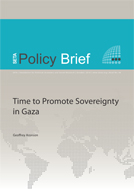The “Lieberman Plan” aims at removing Israel’s “effective control” over Gaza, without compromising Israeli security or intruding upon its own sovereignty.
Significant elements of Israel’s foreign and defence policy system are considering how to win international support for a second disengagement from Gaza that will end Israel’s status as an occupying power in the Gaza Strip, occupied by Israel since June 1967. Israel’s continuing control over Gaza’s sea and air corridors are recognized as sufficient to invest Israel with de facto control over the territory in question, thus meeting the international standard for the continuing characterization of Israel’s role as an occupying power. The “Lieberman Plan” aims at removing Israel’s “effective control” over Gaza, without compromising Israeli security or intruding upon its own sovereignty. Under a post-occupation regime, Gaza should be able to trade and interact freely with the world. Israel should be encouraged by the international community to pursue this effort, even as US-led diplomacy continues. Turkey is well-placed to play a leading role in this effort. The international community must, however, establish its own benchmarks so that Israel will truly end its control over Gaza, enabling Palestinians there to recover from the draconian trade restrictions now in place and establishing the vital principals of Palestinian independence and sovereignty.
***
Introduction Significant elements of Israel’s foreign and defence policy system are seriously considering how to win international support for a second disengagement from Gaza that will end Israel’s status as an occupying power, at least in Gaza, and “force” Gaza to become sovereign. The Gaza Strip is a 360 sq.km. sliver of land 6-12km km wide with a growing population of 1.6 million squeezed between Israel and Egypt and hugging a 40 km stretch of the Mediterranean coast. The area has been under the uncontested rule of the Islamic Resistance Movement – Hamas – since June 2007. It is still suffering the effects of Operation Cast Lead, an Israeli military incursion in January 2009 as well as long running and draconian restrictions on the Gaza economy implemented by Israel. On July 16, 2010, the Israeli newspaper Yediot Aharanot revealed that “A confidential document sent to [Foreign Minister Avigdor] Lieberman recently states that ‘we must discreetly approach the US, UN Secretary-General Ban Ki-moon and renowned international law experts to examine their terms for international recognition of an end to the occupation.’" A “sovereignty in Gaza first” scenario is anathema to almost all the major diplomatic players, but increasingly less so for Israel and Hamas. Their relationship is at the heart of the major developments in Israel-Palestine affairs during the last decade, beginning with the second intifada, including Israel’s 2005 disengagement from Gaza and its 2009 incursion, and continuing with the seemingly endless siege on Gaza. While diplomacy between Israel and the PLO, represented by chairman Mahmoud Abbas, has been stalemated for a decade, Israel and Hamas have had arguably greater success in fashioning different “rules of the game” – principally in and around Gaza – that could well define the future of relations between Israelis and Palestinians. The “Lieberman Plan” was outlined in a document prepared by Israel’s foreign ministry, which Lieberman heads. The object of the ministry’s attention was not the West Bank, the focus of current diplomatic efforts lea










